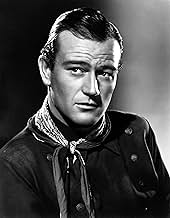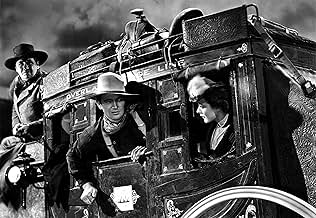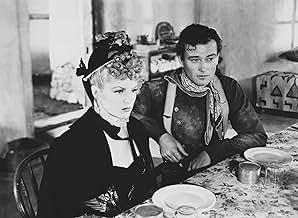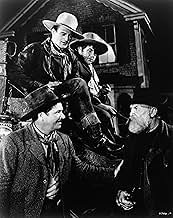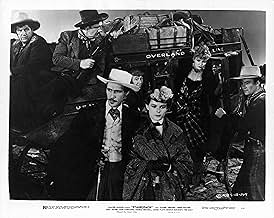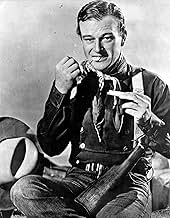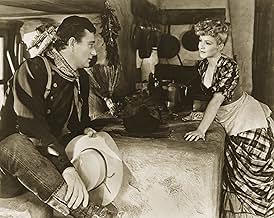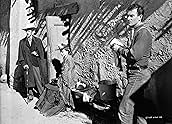Un groupe de personnes voyageant en autocar trouvent que leur trajet est compromis par la menace de Geronimo et en apprend quelque choses les uns des autres.Un groupe de personnes voyageant en autocar trouvent que leur trajet est compromis par la menace de Geronimo et en apprend quelque choses les uns des autres.Un groupe de personnes voyageant en autocar trouvent que leur trajet est compromis par la menace de Geronimo et en apprend quelque choses les uns des autres.
- Réalisation
- Scénario
- Casting principal
- Récompensé par 2 Oscars
- 10 victoires et 5 nominations au total
- Girl in Saloon
- (non crédité)
- Indian Scout
- (non crédité)
- Bit Part
- (non crédité)
- Bit Part
- (non crédité)
- Lordsburg Saloon Owner
- (non crédité)
Avis à la une
The Ringo Kid has been wrongly accused of a crime and is on his way to Lordsburg to avenge both the false accusations and more importantly, the murder of his father and brother. Dallas (Claire Trevor) is implied to be a prostitute, and so is ostracized from Tonto (which means "stupid", "foolish" or "daft" in Spanish) by a self-stylized matronly moral majority. Doc Boone (Thomas Mitchell) is far more concerned with getting drunk than being a doctor, and is partially ostracizing himself from Tonto. Hatfield (John Carradine) is a "gambler gentleman" with a shady reputation and a false identity. Lucy Mallory (Louise Platt) is trying to get to her husband, who is in the military; she's in a surprisingly "secret" physical state. Samuel Peacock, whom everyone keeps mistaking for a reverend, is in the alcohol business and just wants to get back east to get back to his business. Henry Gatewood is a crooked banker trying to flee before his questionable dealings are discovered. And the stagecoach drivers consist of a lovable buffoon, Buck (Andy Devine) and the most forthright, straight arrow of the bunch, Marshal Curly Wilcox (George Bancroft).
Even though Stagecoach remains tightly focused on its wilderness road trip, that might seem like a large stable of characters to shape into a taut plot. Ford, working from script by Dudley Nichols and Ben Hecht, based on a short story, "Stage to Lordsburg", by Ernest Haycox (which itself bears a relation to Guy de Maupassant's "Boule de Suif", 1880), keeps the proceedings in check by only giving us the information we need to explore the evolving relationships, and only focusing on each character when they're important to the plot. This results in a few of the characters being functionally absent for extended lengths of time, but Ford can so easily establish a "deep" character with a minimum of screen time that the absences are not a detriment.
The principal focus, of course, is between Ringo and Dallas, as on a significant level, Stagecoach becomes a romance. They're initially brought together via their mutual ostracization, even among the ostracized, which gives them an immediate bond beyond their physical attraction towards one another. Wayne and Trevor are both fantastic in their roles, avoiding the occasional overacting by some other performers. But this is a film where it's difficult to count the slight overacting as a flaw, as it was more of a stylistic tendency of the genre during this period and it provides a nice counterbalance to Wayne and Trevor.
Stagecoach is also famous for its setting. Much of the film was shot in Utah's Monument Valley, along authentic stagecoach "roads". The (beautiful) starkness of the desert is often taken as a symbolic trip through a kind of purgatory for the characters, where they're left alone with their souls, their only connection being their small group, to contemplate their pasts and futures. Whether we choose to read something along those lines into the film or not, Monument Valley is at least a captivating presence in the film, although for me, the cinematography could have been better technically, especially considering that Stagecoach was made at the same time as The Wizard of Oz (1939). Ford's famous tendency to do only one take results in a couple minor gaffes, such as the initial shot of John Wayne--a zoom into a close-up--that is out of focus for most of the zoom.
As one could guess, eventually our passengers run into a band of Apaches, who are often interpreted as representing more of a "natural force" that our heroes must surmount. The climax features a fabulous extended chase/fight sequence with a number of amazing stunts by both humans and animals. The most impressive human stunts are performed by the legendary Yakima Canutt, including one that involved being dragged through the dirt by the horse-pulled stagecoach, which was moving along at about 40 miles per hour and supposedly missed running over Canutt by only 12 inches (30.5 cm). This scene was an inspiration for a similar stunt in Steven Spielberg's Raiders of the Lost Ark (1981).
Although it's not a "perfect" film to me, and it's not even my favorite western (I'm more partial to the classic spaghetti westerns, for example), Stagecoach is a very good film and was very influential, despite being made at a time when Ford was told that he was committing professional suicide by even contemplating a western. As the plethora of critical literature attests, it works on many levels, including as an allegorical microcosm of U.S. Depression-era society, and should be seen at least once by anyone serious about film literacy.
But the real star of the show is John Ford, the director. To introduce and define nine characters in the context of a fast-paced western is no easy task, and he accomplishes it in masterly fashion. Much of the action takes place in the limited confines of a stagecoach, but Ford takes advantage of the limits by staging brilliant and subtle bits between characters; John Wayne casts sultry glances at Clare Trevor, who blossoms under his glance, the young calvary wife's eyes glaze over as the banker pontificates, and Doc sneaks sips of whiskey from the samples case while he solicitously keeps the wind from chilling the whiskey salesman. When the action moves outside, he films the action in dynamic angles and stunts that were the most daring of its time.
If you enjoy westerns and haven't seen this, you have a great night of film-watching ahead of you. And if the last time you saw Stagecoach was some midnight years ago when you wandered home for a bit of the late show before bedtime, watch it again and rediscover what a great western it is
It's all based on a short story called appropriately Stage to Lordsburg but also on a French story (Guy de Maupassant's Boule de Suif) with similar characters traveling in a coach during the Franco-Prussian War.
The basic structure of the plot is also familiar to fans of disaster films. Passengers are introduced, board a common conveyance and face a tremendous danger. The exciting adventure of who lives, who dies, will the stage make it to its destination, and what happens next is highlighted by perhaps the most famous stunts in film history by the most famous and respected stuntman of all Yakima Canutt. If one of the stunts looks familiar, Steven Speilberg recreated it for his first Indiana Jones film.
The film is also a lot more. Unlike other westerns up to its time which were mainly shoot-em-ups between the good guys in the white hats and the bad guys in the black hats, it examines very serious social issues and how different people look down at others differently. Besides prejudice, some of the characters are flawed with alcoholism, greed and revenge. We also see the good in bad people with respect for new life and ultimately redemption. Nominated for seven Academy Awards, including Best Picture, Best Director, Best Cinematography, Best Interior Decoration, Best Film Editing, Best Supporting Actor (won) and Best Score (won), Stagecoach was John Ford's first sound Western and elevated the genre in both critical praise and popularity. The low camera angles in Monument Valley would become a John Ford trademark. Despite doing 70 films, this is the one that made Wayne a star and it's easy to see why. Many consider it his best performance; both subtle and clear he cares for the needs of the people around him and yearns for his own need for a home, a wife and a family. It is considered one of the great films in cinemas greatest year, 1939. Gone With the Wind, Goodbye Mr. Chips, Mr. Smith Goes to Washington, Wuthering Heights, Dark Victory, The Wizard of Oz, Of Mice and Men and Ninotchka were all nominated for best picture alongside Stagecoach that year.
Regarding the political incorrectness of an Apache uprising, well, they happened. If you just happened to be in a stagecoach in the middle of the southwest during an Apache uprising chances are you would be killed. This story does not examine the reasons for the uprising only the effects on a group of travelers trying to travel through it.
Le saviez-vous
- AnecdotesYakima Canutt explained how the stunt was accomplished where, as an Apache warrior attacking the stagecoach, he is "shot", falls off his horse, and then gets dragged underneath the stagecoach: "You have to run the horses fast, so they'll run straight. If they run slow, they move around a lot. When you turn loose to go under the coach, you've got to bring your arms over your chest and stomach. You've got to hold your elbows close to your body, or that front axle will knock them off." After the stunt was completed, Canutt ran to director John Ford to make sure they got the stunt on film. Ford replied that even if they hadn't, "I'll never shoot that again."
- GaffesBefore Ringo hands his Winchester rifle to Curley after finding him stranded outdoors on the stagecoach trail, he ejects a chambered round, which after flying behind his head, can be heard as a knock as if hitting the soundstage floor. Also, it would have been unrealistic to waste a live round of ammunition with hostile Indians in the area, especially after telling Curley that he (Curley) may need his Winchester.
- Citations
Marshal Curly Wilcox: Come busting in here - you'd think we were being attacked! You can find another wife.
Chris: Sure I can find another wife. But she take my rifle and my horse. Oh, I'll never sell her. I love her so much. I beat her with a whip and she never get tired.
Dr. Josiah Boone: Your wife?
Chris: No, my horse. I can find another wife easy, yes, but not a horse like that!
- Versions alternativesAlso available in a computer-colorized version.
- ConnexionsEdited into Laramie (1949)
- Bandes originalesTrail to Mexico (Bury Me Not on the Lone Prairie)
(uncredited)
Traditional ballad
Variations played throughout as part of the score
Meilleurs choix
- How long is Stagecoach?Alimenté par Alexa
Détails
- Date de sortie
- Pays d’origine
- Langues
- Aussi connu sous le nom de
- La Diligence
- Lieux de tournage
- Agathla Peak, Arizona, États-Unis(Peak in background at start of stagecoach trip)
- Société de production
- Voir plus de crédits d'entreprise sur IMDbPro
Box-office
- Budget
- 392 000 $US (estimé)
- Durée
- 1h 36min(96 min)
- Couleur
- Rapport de forme
- 1.37 : 1



